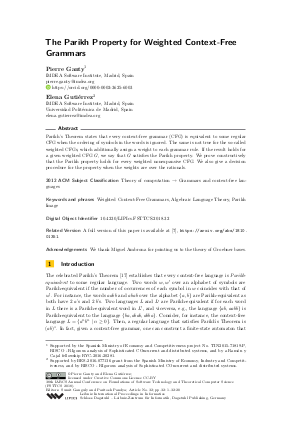The Parikh Property for Weighted Context-Free Grammars
Authors
Pierre Ganty  ,
Elena Gutiérrez
,
Elena Gutiérrez
-
Part of:
Volume:
38th IARCS Annual Conference on Foundations of Software Technology and Theoretical Computer Science (FSTTCS 2018)
Part of: Series: Leibniz International Proceedings in Informatics (LIPIcs)
Part of: Conference: IARCS Annual Conference on Foundations of Software Technology and Theoretical Computer Science (FSTTCS) - License:
 Creative Commons Attribution 3.0 Unported license
Creative Commons Attribution 3.0 Unported license
- Publication Date: 2018-12-05
File

PDF
LIPIcs.FSTTCS.2018.32.pdf
- Filesize: 0.56 MB
- 20 pages
Document Identifiers
Related Versions
Subject Classification
ACM Subject Classification
- Theory of computation → Grammars and context-free languages
Keywords
- Weighted Context-Free Grammars
- Algebraic Language Theory
- Parikh Image
Metrics
- Access Statistics
-
Total Accesses (updated on a weekly basis)
0PDF Downloads0Metadata Views
Abstract
Parikh's Theorem states that every context-free grammar (CFG) is equivalent to some regular CFG when the ordering of symbols in the words is ignored. The same is not true for the so-called weighted CFGs, which additionally assign a weight to each grammar rule. If the result holds for a given weighted CFG G, we say that G satisfies the Parikh property. We prove constructively that the Parikh property holds for every weighted nonexpansive CFG. We also give a decision procedure for the property when the weights are over the rationals.
Cite As Get BibTex
Pierre Ganty and Elena Gutiérrez. The Parikh Property for Weighted Context-Free Grammars. In 38th IARCS Annual Conference on Foundations of Software Technology and Theoretical Computer Science (FSTTCS 2018). Leibniz International Proceedings in Informatics (LIPIcs), Volume 122, pp. 32:1-32:20, Schloss Dagstuhl – Leibniz-Zentrum für Informatik (2018)
https://doi.org/10.4230/LIPIcs.FSTTCS.2018.32
BibTex
@InProceedings{ganty_et_al:LIPIcs.FSTTCS.2018.32,
author = {Ganty, Pierre and Guti\'{e}rrez, Elena},
title = {{The Parikh Property for Weighted Context-Free Grammars}},
booktitle = {38th IARCS Annual Conference on Foundations of Software Technology and Theoretical Computer Science (FSTTCS 2018)},
pages = {32:1--32:20},
series = {Leibniz International Proceedings in Informatics (LIPIcs)},
ISBN = {978-3-95977-093-4},
ISSN = {1868-8969},
year = {2018},
volume = {122},
editor = {Ganguly, Sumit and Pandya, Paritosh},
publisher = {Schloss Dagstuhl -- Leibniz-Zentrum f{\"u}r Informatik},
address = {Dagstuhl, Germany},
URL = {https://drops.dagstuhl.de/entities/document/10.4230/LIPIcs.FSTTCS.2018.32},
URN = {urn:nbn:de:0030-drops-99315},
doi = {10.4230/LIPIcs.FSTTCS.2018.32},
annote = {Keywords: Weighted Context-Free Grammars, Algebraic Language Theory, Parikh Image}
}
Author Details
Funding
- Ganty, Pierre: Supported by the Spanish Ministry of Economy and Competitiveness project No. TIN2015-71819-P, RISCO - RIgorous analysis of Sophisticated COncurrent and distributed systems, and by a Ramón y Cajal fellowship RYC-2016-20281.
- Gutiérrez, Elena: Supported by BES-2016-077136 grant from the Spanish Ministry of Economy, Industry and Competitiveness, and by RISCO - RIgorous analysis of Sophisticated COncurrent and distributed systems.
References
- Gerd Baron and Werner Kuich. The Characterization of Nonexpansive Grammars by Rational Power Series. Information and Control, 48(2):109-118, 1981. URL: http://dx.doi.org/10.1016/S0019-9958(81)90634-3.
- Vijay Bhattiprolu, Spencer Gordon, and Mahesh Viswanathan. Extending Parikh’s Theorem to Weighted and Probabilistic Context-Free Grammars. In QEST 2017, pages 3-19, 2017. URL: http://dx.doi.org/10.1007/978-3-319-66335-7_1.
-
David A. Cox, John Little, and Donal O'Shea. Ideals, varieties, and algorithms - an introduction to computational algebraic geometry and commutative algebra (2. ed.). Undergraduate texts in mathematics. Springer, 1997.

- Javier Esparza. Petri Nets, Commutative Context-Free Grammars, and Basic Parallel Processes. Fundam. Inform., 31(1):13-25, 1997. URL: http://dx.doi.org/10.3233/FI-1997-3112.
- Javier Esparza, Pierre Ganty, Stefan Kiefer, and Michael Luttenberger. Parikh’s theorem: A simple and direct automaton construction. Inf. Process. Lett., 111(12):614-619, 2011. URL: http://dx.doi.org/10.1016/j.ipl.2011.03.019.
-
Javier Esparza, Peter Rossmanith, and Stefan Schwoon. A Uniform Framework for Problems on Context-Free Grammars. Bulletin of the EATCS, 72:169-177, 2000.

- Pierre Ganty and Elena Gutiérrez. The Parikh Property for Weighted Context-Free Grammars (extended version). arXiv, 2018. URL: http://arxiv.org/abs/1810.01351.
- Pierre Ganty and Rupak Majumdar. Algorithmic Verification of Asynchronous Programs. CoRR, abs/1011.0551, 2010. URL: http://arxiv.org/abs/1011.0551.
- Stefan Göller, Richard Mayr, and Anthony Widjaja To. On the Computational Complexity of Verifying One-Counter Processes. In LICS 2009, pages 235-244, 2009. URL: http://dx.doi.org/10.1109/LICS.2009.37.
- Jozef Gruska. A Few Remarks on the Index of Context-Free Grammars and Languages. Information and Control, 19(3):216-223, 1971. URL: http://dx.doi.org/10.1016/S0019-9958(71)90095-7.
- Dung T. Huynh. The Complexity of Equivalence Problems for Commutative Grammars. Information and Control, 66(1/2):103-121, 1985. URL: http://dx.doi.org/10.1016/S0019-9958(85)80015-2.
- Thiet-Dung Huynh. The Complexity of Semilinear Sets. In ICALP 1980, pages 324-337, 1980. URL: http://dx.doi.org/10.1007/3-540-10003-2_81.
- Thiet-Dung Huynh. Deciding the Inequivalence of Context-Free Grammars with 1-Letter Terminal Alphabet is Σ^P₂-complete. In FOCS 1982, pages 21-31, 1982. URL: http://dx.doi.org/10.1109/SFCS.1982.65.
- Werner Kuich. The Kleene and the Parikh Theorem in Complete Semirings. In ICALP 1987, pages 212-225, 1987. URL: http://dx.doi.org/10.1007/3-540-18088-5_17.
- Werner Kuich and Arto Salomaa. Semirings, Automata, Languages, volume 5 of EATCS Monographs on Theoretical Computer Science. Springer, 1986. URL: http://dx.doi.org/10.1007/978-3-642-69959-7.
- Michael Luttenberger and Maximilian Schlund. Convergence of Newton’s Method over Commutative Semirings. Inf. Comput., 246:43-61, 2016. URL: http://dx.doi.org/10.1016/j.ic.2015.11.008.
- Rohit Parikh. On Context-Free Languages. J. ACM, 13(4):570-581, 1966. URL: http://dx.doi.org/10.1145/321356.321364.
-
Ion Petre. Parikh’s theorem does not hold for multiplicities. Journal of Automata, Languages and Combinatorics, 4(1):17-30, 1999.

- Thomas W. Reps, Stefan Schwoon, Somesh Jha, and David Melski. Weighted pushdown systems and their application to interprocedural dataflow analysis. Sci. Comput. Program., 58(1-2):206-263, 2005. URL: http://dx.doi.org/10.1016/j.scico.2005.02.009.
- Koushik Sen and Mahesh Viswanathan. Model Checking Multithreaded Programs with Asynchronous Atomic Methods. In CAV 2006, pages 300-314, 2006. URL: http://dx.doi.org/10.1007/11817963_29.
- Kumar Neeraj Verma, Helmut Seidl, and Thomas Schwentick. On the Complexity of Equational Horn Clauses. In CADE 2005, pages 337-352, 2005. URL: http://dx.doi.org/10.1007/11532231_25.
